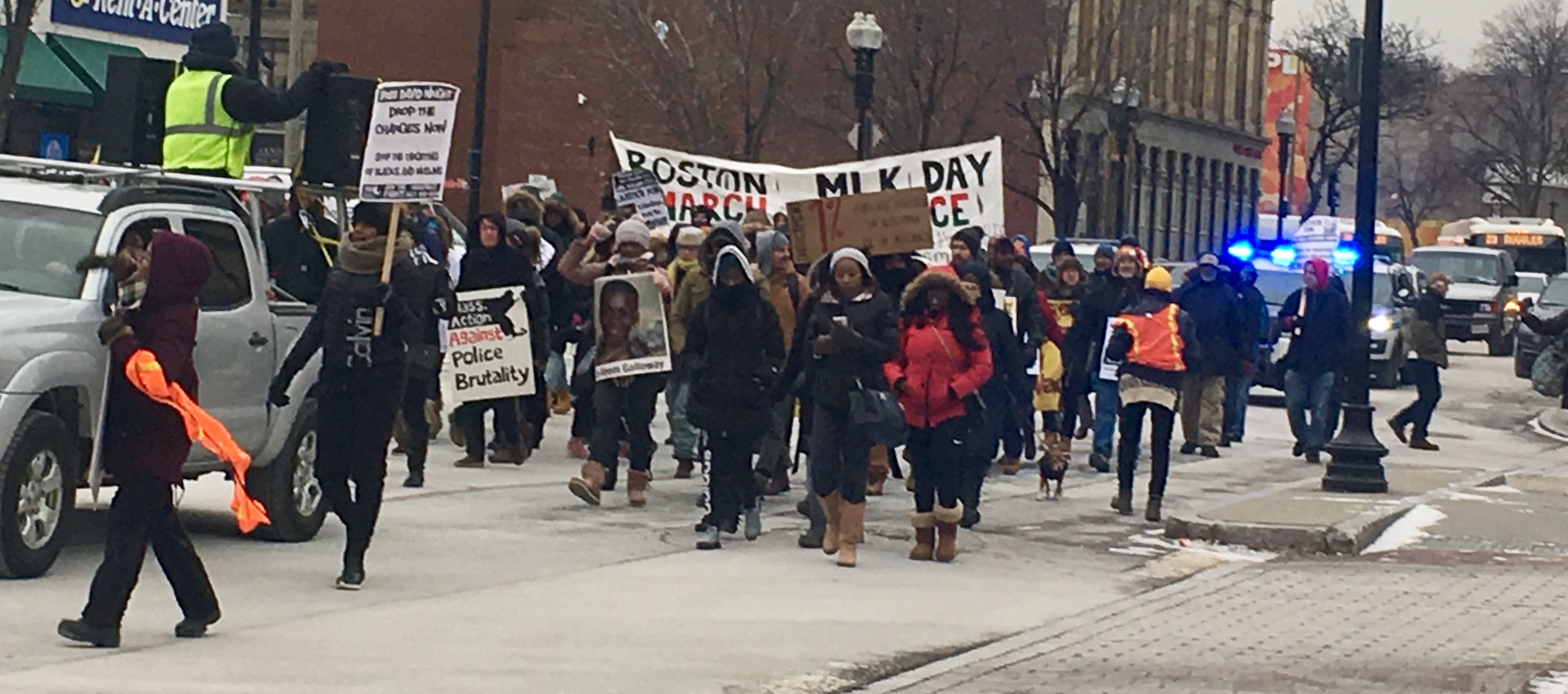It was clear who the veterans of the March for Justice were. They wore ski pants. On this freezing January 15th, a group of near-60 people marched from Grove Hall to Dudley Cafe. They chanted against police brutality. The third annual Martin Luther King March on Justice illustrated participants’ commitment to progress.
The volunteer organization that initiated the march, Mass Action Against Police Brutality (MAAPB), opened a warm space at the end of the one-and-a-half mile march. Dudley Cafe, decorated with paintings of Malcolm X and maps of African American memorials, provided a site for post-march reflection. MAAPB representatives passed out hot chocolate and sandwiches.
Marchers clustered into seats as the leaders of MAAPB reflected on the importance of the protest.
“Martin Luther King wasn’t afraid to take it to the streets,” said MAAPB co-founder Brock Satter. “He was very intelligent and articulate. He saw the importance of linking his faith with the people…[Today], we need to find each other and organize, and build trust and build strategies to win. Because we’re up against a lot and the stakes are very, very high.”
His co-founder outlined these stakes. Tahia Sykes highlighted the emotional and physical destruction of police brutality as she introduced the mother of David Wright. Wright was sentenced to a lifetime in prison on December 19, 2017. Before that, he had hardly left his home. He and his family plead his innocence.
“It’s important for us to know that people are fighting for their lives,“ said Sykes. “This isn’t a game. This isn’t something that just happened. It’s not because Trump is in office. This is before Trump. Our lives are constantly being considered ‘less than.’”
Wright’s mother stood to give an account of her son’s treatment. Police arrested him in June, 2015.
“It was treacherous then, it’s treacherous still. They came through our house. They locked us out of the house. They got my brother. They got my son. They kept them inside the house for 10 hours, interrogating them,” she said.
As the co-founders shifted the discussion to “what’s next” for police brutality, Satter addressed a most recent topic of news.
“We definitely want to acknowledge the passing of Erica Garner that just happened,” said Satter. If you don’t know who she was, that’s the daughter of Eric Garner, one of the major police brutality cases that started this whole wave of protests. She died at 27 years-old from a heart attack. I have no question at all that a major contributing factor was that justice was denied that family.”
He noted that the outcome the justice system served to the Garner family fell short.
“A lot of people may want to look at the fact that they did actually get a settlement from the city. But they got no justice. There was never any indictment on Daniel Pantaleo, the cop that choked him to death, with an illegal chokehold, caught on camera for the world to see. To this day, the prosecutors never released the proceedings of the grand jury,” said Satter.
While stories of Erica Garner’s death pervade today’s media, the MAAPB leaders noted that police brutality receives less media attention today than three years ago. Donald Trump, with a an ever-changing set of statements and scandals, consumes most media attention today. MAAPB affirms that police brutality need to remain a focus, as well.
“It needs to be a part of all the narratives,” said Sykes, “so that when people say that Trump is racist, they need to address the unlawful killings and lack of indictments across the country. They need to focus on the fact that Trump was and is supported by police unions.”
Since police brutality protests began in 2014, over 2,902 people have been killed by police, according to the non-profit Fatal Encounters. The action needs to be immediate, Sykes notes, and call character into question.
“A lot of people say we need to have a lot of meetings about this,” said Sykes. “But you know what you’re doing [in the police]. You know that you took someone’s loved one away unnecessarily. You know that you came to work today, and you may not have intended to murder someone, but you’re not being held accountable for the fact that you did murder someone today.”
Government action also requires character and immediacy, Sykes noted.
“[Murder] has to be addressed immediately. It can’t be swept under the rug. It can’t be another one of Mayor Walsh’s ‘We have a beautiful Boston here’ speeches. The people that are most impacted by these behaviors are not addressed or get no attention.”
The MAAPB co-founders played Dr. King’s “I Have a Dream” speech to close the gathering.
“This is no time to engage in the luxury of cooling off or to take the tranquilizing drug of gradualism,” King said in 1963. “Now is the time to make real the promises of democracy. Now is the time to rise from the dark and desolate valley of segregation to the sunlit path of racial justice. Now is the time to lift our nation from the quicksands of racial injustice to the solid rock of brotherhood.”

Leave a Reply
You must be logged in to post a comment.